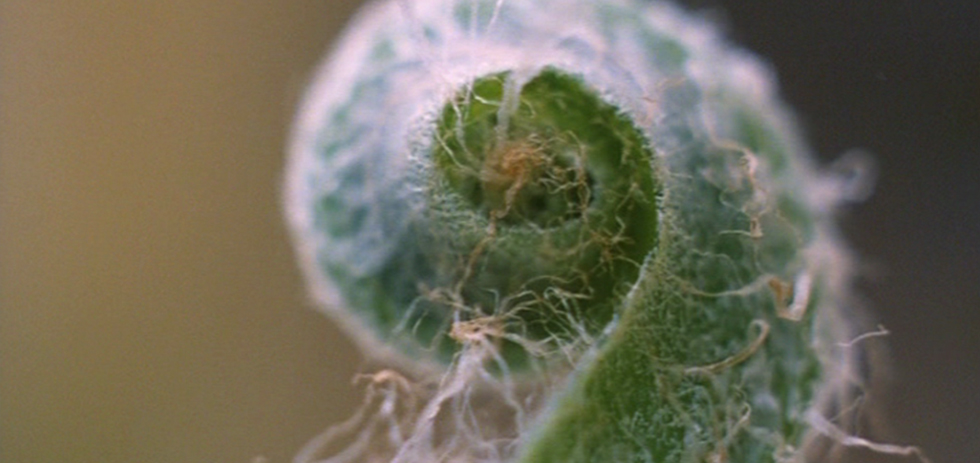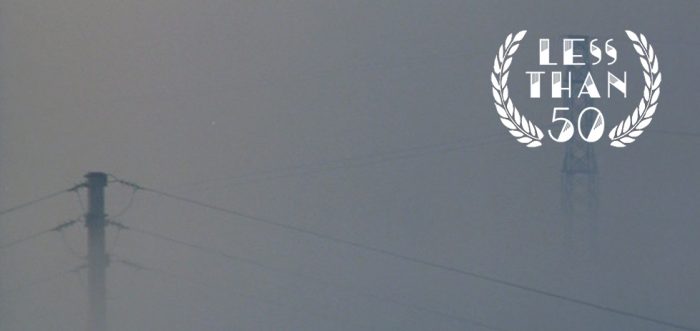In our regular column, Less Than (Five) Zero, we take a look at films that have received less than 50 logged watches on Letterboxd, aiming to discover hidden gems in independent and world cinema. This week Nicholas Page looks at Franco Piavoli’s The Blue Planet.
Date Watched: 11th January, 2016
Letterboxd Views (at the time of viewing): 38
Like the giddy, distorted faces of children reflected in fairground mirrors, elongating bubbles chase one another beneath the transparent ice of a frozen lake. A patterned snail moves steadily, thoughtfully across growing blades of grass in some kind of incremental, instinctive race towards the sun. Daylight creeps over dusty windowsills and among long-forgotten furniture, scattering motes of dust and fluttering the eyelids of a slumbering sleeper. The creak of an aged wooden door as it is opened, tentatively at first, over cold flagstones worn smooth by centuries of shuffling shoes. Outside, the first notes of springtime: keen birdsong, bright sunshine and the freshness of one season giving way to the next. Inside, stillness and silence in which the smallest scrape is amplified thousandfold. An absence of light and noise and life, but a closeness to something higher, something sublime.
This is the world of Franco Piavoli: a distinctive, meditative approach to a cinema that is seemingly forever ensconced within the lazy confines of a breezy summer’s day. A cinema less defined by words and actions than it is concerned with moments: those moments that subtly shape the course of our lives, from the innocence of youth to the buzz of sexual awakening; from the daily vigor of adult life to the slow decay of old age. When considering Piavoli’s work, it seems only right to begin at that first breath of wind, as the director himself has described it: the precise juncture when one breaks free of stasis and a creative passion takes over. With Piavoli, this moment is embodied by his 1982 film The Blue Planet – the result of years’ work and some patient cajoling from fellow director Silvano Agosti, who provided the Pozzolengo native with the Arriflex camera used to shoot his debut feature.
“So one thing from another rises ever; and in fee-simple life is given to none but unto all mere usufruct.” This is the Lucretius quote that opens the film, and indeed the prevailing thematic influence behind The Blue Planet is undoubtedly the idea of time passing. How the inexorable forward strides of time affect our natural world and we who inhabit it; as is represented in the changing of the seasons and the changing of the generations, as one group of grizzled survivors reach their Winter and give way to the Spring of a new and bright-eyed crowd. In an interview that is bundled with the L’Immagine DVD edition of the film, Piavoli speaks of three temporal planes that can be seen to overlap here: a day, a year and thousands of years. Indeed, with the opening shots of ice melting and trees dripping, not only the passing but also the origin of time is suggested. He also alternates long shots of figures and landscapes with detailed close-ups, almost so as to capture natural progression in its grandest and minutes of forms. Or perhaps, to state that we are really not that much different in the eyes of the Gods to the insects that scuttle about among our feet.

While The Blue Planet is indeed emblematic of what Piavoli stands for as a filmmaker, and is often presented as such, there are his other works to consider. Two of which, in Voices Through Time and At the First Breath of Wind, could also have easily qualified to feature here, with 29 and 34 Letterboxd views at the time of writing. In many ways, these three works (regretfully ignoring the earlier Nostos: The Return, which is the only of his titles to have garnered 50 viewings) can be considered a loose trilogy, each existing upon some hazy bucolic landscape and telling their own overlapping tale of life and love. Voices Through Time expands upon these themes somewhat to dwell upon the figures of an isolated village, once again placing these within the context of the changing seasons and coming of age. At the First Breath of Wind, on the other hand, reduces this setting to a sun-dappled farmstead, around which the idle and preoccupied forms of various family members pass their days in respective solitude.
In a year when fellow countryman Luca Guadagnino has quite bluntly underlined a crippling loss of language in contemporary Italian film, it might be worth pushing the shy, retiring Piavoli to the forefront once again in order to be rediscovered by the current generation. The likes of Stan Brakhage, Bernardo Bertolucci and even Andrei Tarkovsky are among those to have spoken of their admiration in the past, with the latter describing The Blue Planet and indeed Piavoli’s entire world as “a poem, journey, concert on nature, the universe, life itself; an image different to that which is always seen.” While Guadagnino’s damning of the current state of Italian film is an accurate one, there are a few pockets of light to be found in all that darkness. Piavoli’s lyrical, patient approach to filmmaking can be seen to live on in the contemplative work of messieurs Michaelangelo Frammartino (Le Quattro Volte) and Roberto Minervini (Stop the Pounding Heart), whose turn it is to now carry the torch.
